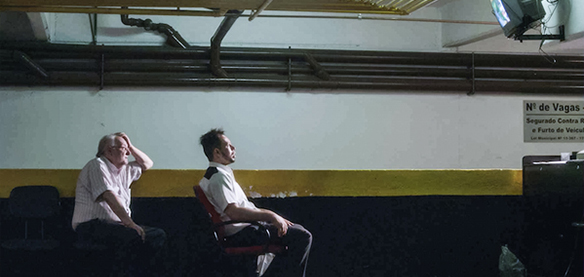

LOCARNO – Brazil-born and living in Madrid, Sergio Oksman has helmed a shorts’ bunch that have taken many awards the world over, including Buenos Aires, Cinema Eyes Honors, Karlovy Vary, Warsaw international festivals and Spanish Academy Awards Goya.
Always playing between fiction and documentary, short “Notes of the Other” told the story of a wannabe Ernest Hemingway double and Hemingway’s own desire to be “somebody else.” Another multi-prized short, “A story for the Modlins,” turns on Elmer Modlin, an extra actor who, after acting in Roman Polanski’s “Rosemary’s Baby,” ran away with his family and they all shut themselves in a dark apartment in Madrid for over thirty years.
He studied journalism in Sao Paulo and New York, and currently works as a docu teacher at Madrid’s ECAM and has founded his own Dok Films production company.
His first feature, “O Futebol” (‘On Football’) turns on a reunion of a father and son who haven’t seen each other for 20 years, with the 2014 World Cup in Brazil as backdrop. Pic competes at Locarno fest.
You used to move in the “docu” field, with strong fiction references (Polanski, Hemingway…). “Futebol” lands in a very personal arena… Is it your own story?
It’s a story that springs from the lives of two real people, me and my father, which I constructed as fiction with Carlos Muguiro.
Like another Spanish documaker of your generation -Elias Seminiani- you like to move in the border between fiction and reality. Would you dare to define this territory?
What probably interests me most about that sphere is that it is difficult to define; problematic, at any rate. The division between what is real and what is fictional is not, I think, something that can be viewed in terms of reality. Look, for instance, at politics in Spain. It shows clearly that so-called reality is, in fact, a realm laden with constructions, mise-en-scenes, constructed language. I think our entire world, not just the cinema, unfolds on that border.
You act in the movie, but the point of view is not exactly yours; it’s as helmer is looking for absolute, spontaneous reality. However, the symmetry of the pictures, the studied sequential shots, the omission of shot and reverse shot… that’s very auteur … isn’t it?
The mise-en-scene is absolutely controlled. Before shooting, we sat down and carefully defined the type of image, composition, even colour range. The external point of view was also clearly determined. I behave as a character, but the film is not told in the first person, i.e., it is not an autobiographical or first person documentary, the way that genre is understood. It is in fact the contrary: the external point of view gives unity to the film.
How did you plan the experience with your father?
In the summer of 2013, I met my father for the first time in 20 years. I hadn’t heard from or seen him for all that time. We spent a day together, spoke about all sorts of things, but mostly football. Most of our memories revolved around experiences we’d shared watching the games of Palmeiras when I was a child. We then agreed to meet again the following year and watch the World Cup together. That’s where the film started. We imagined that new situation like it was a fiction script: the characters were, effectively, real, but the need for control that was there at the beginning of the shoot was more inherent to fiction. The surprising and unexpected thing was that after a few days, Simao (my father, who was playing the “character” of the father) suffered a heart attack and died. The film is the result of this strange situation: the absolute desire for control on the filmmaker’s part, and the sudden occurrence of something completely unexpected.
It’s very suggesting how Brazil 2014 acts as the film’s background, and how it interacts with the father-and-son relationship….Especially when the Brazilian team loses…
The World Cup in itself is something fictional. It’s got a fixed time schedule, main characters, a perfectly defined structure, with great emotions and disappointments, till the grand finale. The World Cup defines the big story in which the small story of two characters, a father and a son, is interwoven – two characters to whom nothing happens. Apparently…The World Cup is full of important dates and events that are broadcast to the entire world…However, what’s really important is what happens in those little daily lives, where death silently creeps in. Nobody notices; it creeps in silently, unassumingly. Deep down, that confrontation is a universal theme.
Have you got a sales agent?
We haven’t yet closed any distribution agreement.
Do documakers view the emerging online distribution systems with hope?
There is no doubt that we are, at present, witnessing the massive transformation that is affecting the entire chain of film production, distribution and exhibition, partly derived from technological changes. Those changes first affected the modes of creation. The only doubt I have with regard to on-line distribution has to do with the screen. It really isn’t the same seeing “O Futebol” on a monitor, on a TV screen, or on the big screen.
What kind of cinema do you want to do in the future?
It’s early yet to talk about that, because my projects usually take time to mature. But I do have some ideas in my head. I’d like to continue to explore those limits we were talking about, between fiction and documentary.
| Av. Dr. Vieira de Carvalho, 192 / 101 - República - CEP 01210-010 - São Paulo - Brazil | +55 11 3031.5522 | super@superfilmes.com.br |